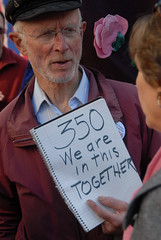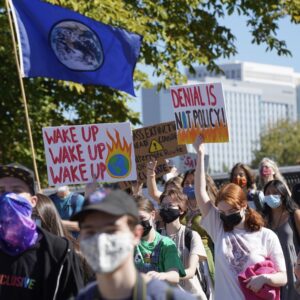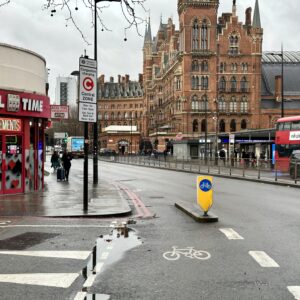
(Photos © J. Maus)
On Saturday, about 1,000 Portlanders joined rallies around the globe to raise awareness of climate change. The 350 Climate Action Rally was part of the 350 campaign, which bills itself as a “global grassroots campaign to stop the climate crisis.”
Not surprisingly, many people came to the rally at Pioneer Courthouse Square by bike. About 40-50 of them met beforehand and rode over en masse to show their support for the cause.
Portland resident Simon Walter-Hansen joined a few others in quiet meditation in Waterfront Park, flanked by 350 banners before riding coming to the rally. He said it was a sign of solidarity for the cause and that it made people stop and think about why they were doing it.
A slew of speakers took the mic to cover the issue from a variety of angles. One of the speakers, a rabbi, spoke of the Biblical Flood of Noah and how Noah warned people about the impending catastrophe for 120 years before it came. “Let’s all be a Noah!” the rabbi exclaimed.
Also at the microphone on Saturday were Metro Councilor Robert Liberty and a representative from Mayor Sam Adams’ office — both were there to read proclamations vowing to fight against the evils of climate change.
Anti-CRC activists made a big impression. Their big, white banners with spray painted slogans like “CRC = Highway to Climate Hell” flew high above the crowd in several locations.
People held banners and cheered at the right times, but throughout the event, the crowd was subdued. For an “action” rally, there sure were a lot of people sitting down in front. I wondered if Portlanders are beyond simply talking about climate change and are instead ready to do something about it. Maybe it’s just me (and I admit I’m growing increasingly cynical these days), but what I hoped would be a historic event was a bit of a disappointment.
Did you attend the rally? What were your impressions?
More images from the rally in the slideshow below:









Thanks for reading.
BikePortland has served this community with independent community journalism since 2005. We rely on subscriptions from readers like you to survive. Your financial support is vital in keeping this valuable resource alive and well.
Please subscribe today to strengthen and expand our work.
Well, the various events worldwide seem to have made an impression:
http://www.350.org/about/blogs/you-made-big-impression
McKibben’s efforts are all about drilling the number 350 parts-per-million into people’s heads as the scientific consensus (as much as there can be such a thing) of the safe level of atmospheric CO2. The 350.org site says we’re at 387 ppm currently. Getting that number down to the safe zone will be a long-term process that requires a lot of commitment from much of the world’s population. You can see how it might be difficult to generate excitement for an event like this; it’s like trying to get people to rally for lowering their cholesterol.
Biking instead of driving helps. Eating veggie-only also helps (both the cholesterol and the climate).
I didn’t make the rally, but I did get a a bit nearer to finishing this great little book:
http://www.powells.com/biblio/1-9780399535017-0
“What’s the Worst That Could Happen?: A Rational Response to the Climate Change Debate,” by Greg Craven (an Oregonian!).
Yawn… Those 350 folks cannot spot a hoax when they see one. Lucky for me I can spot spot a Green Weenie soon ’nuff to pedal around them.
The reason that nothing has been done regarding reducing CO2, is that the powers that be have been disseminating doubts of CO2 existence & it’s true consequences. Climate change inaction is living proof the capitalism has failed us. Had we not wasted the past 20 years, ignoring the science NASA had presented the government, maybe we wouldn’t have to make the drastic cuts necessary now in CO2 that is needed to get back to 350. Reducing the speed limit from 65mph to 50mph will cut CO2 emissions 21% from cars. That doesn’t cost anything and every business has to work within the same parameters. Government can’t even do something that simple, to cut down our carbon footprint. Jimmy Carter did it during the Oil Embargo of the 70’s, and this is much more important.
Yeah, it was blip on the Portland radar, but in Ethiopia 15,000 people took to the streets. Ethiopia does not have the privilege to be at the Copenhagen talks, neither will the hundreds of countries that have the most to lose that also participated in the events on Saturday.
global change is possible. change in the USA is necessary!
I attended the first hour of the event (two hours is WAY too long for an event like this, in my opinion, unless you’re going to MARCH somewhere).
What I felt was missing (or at least not highlighted) was what all the experts and politicians and local figures really wanted us TO DO, now that we’re fired up. The most useful item was the person from Sam Adams’ office encouraging folks to support the Climate Action Plan this Wednesday when it comes up for discussion (at City Council, I believe?)
Otherwise it was a lot of talking, a lot of clapping, a nice visual with a lot of banners and such, but no MOMENTUM. I wanted to be spurred to do something new, something challenging. Instead I just left early and rode my bike home…
The power of the event was in its worldwide nature, certainly, but it could have been more effective on a local level.
Climate and climate change is a vast and not very well understood subject. It’s so easy to go along with all the rhetoric, but can you prove it to yourself? (The sky is falling! The world’s gonna catch fire!)
I think it’s more worthwhile to focus on provable effects and strong positive correlations (like asthma, obesity, etc). The climate change discussion is too easy to dismiss as a big, gray mess of contradictions.
Just a reminder: Rearing cattle produces more greenhouse gases than driving cars, according to the UN:
From: http://www.un.org/apps/news/story.asp?NewsID=20772&Cr=global&Cr1=environment
“Which causes more greenhouse gas emissions, rearing cattle or driving cars?
Surprise!
According to a new report published by the United Nations Food and Agriculture Organization, the livestock sector generates more greenhouse gas emissions as measured in CO2 equivalent – 18 percent – than transport. It is also a major source of land and water degradation.”
From: http://www.fao.org/newsroom/en/news/2006/1000448/index.html
It’s so awesome to see people riding bicycles more than driving, there are many benefits. But if we’re serious about slowing global warming, we have to eat less meat.
April #7 – From a dietary standpoint we need to eat more meat, not less. What you assert about the industry is unsupported, and completely unprovable. Don’t let that stop you from promoting your lifestyle though.
You do make my point nicely, thank you. Cars are less harmful to the planet than cow-farts.
Agreed, Jonathan – Portland turnout was a bit disappointing given the severity of the situation. It serves to highlight that the US climate-denying propaganda machine is still in full swing, and it’s very, very effective. a Pew poll released this month showed that only 57% of the US population believes there is solid evidence that the Earth is warming – down from holding steady around 80% since 1997. This despite a scientific consensus that the globe is warming and that we are behind it.
On a more positive note, as Shantastic noted, participation in other countries was impressive. It was called the largest coordinated international political action of all time. The “Third World” countries, especially, have a sense of urgency about this crisis, and I think that’s something to be optimistic about. Even though we may be surrounded by people with their heads in the sand here in the First.
Vance: Are you saying you magically know more than the folks from the UN, who won a Nobel prize for their research?
@Vance/8
I don’t understand your reasoning. Why do we need to eat more meat? So there will be less cows farting? There are somewhere in the billions of additional animals on the planet due to human activity (i.e., breeding).
Also, why is not possible to prove, or at least measure with reasonable accuracy, which sector produces more C02, regardless of whether you believe CO2 is causing global warming?
@Andres/9
See, you say “scientific consensus” and that sounds all high-falutin’, but that’s not proof. Plus, there are skeptics in the scientific community–should they be burned at the stake or perhaps tried for heresy?
Don’t get me wrong; I think this is an important discussion, but when it’s not OK to hold a dissenting opinion or even to pose a question, there’s a real problem.
By the way, does anyone know where the Second World is?
Uh, no. We need to eat less meat, not more.
Thanks!
Part of the reason for the lack of zest at the rally is that there’s not a clear face for us to be mad at with global warming.
With an anti-War rally, you’ve got well known faces to burn in effigy. But climate change is all our fault, and even the deniers are not well known yet.
That needs to change. The oil executives and the Glenn Becks of the world should be targets for ridicule and harrassment. As this movement builds momentum, we will put our enemies in their proper place to receive our wrath.
Lots of things to do right now. Call your senators from the states that you came from and tell them to support the Boxer-Kerry climate bill. Or Call Obama and tell him to go to/speak out about Copenhagen! Read up on how much of a big deal the Copenhagen talks are for determining human response to climate change. A lot is at stake and you can help!
Gore is a fraud. Plants need co2 to live, more co2 more plants. Without plants we would then get global warming. By the way- how is it we had 7 previous ice ages and warmings without any cars? Don’t drink the cool aid
Jim, ice ages have occurred for different reasons.
Continents moving and changing ocean patterns, volcanoes darkening the sky, comets hitting the earth, etc.
Since it seems possible that the worlds climate can be thrown out of whack by a variety events, why then would human influence not be considered also?
In response to many of these comments, I just have to once again plug Greg Craven’s book:
http://www.powells.com/biblio/1-9780399535017-0
The mantra of the book is: “I don’t need to know who is right (in the climate change debate) to make a decent bet.”
In any situation where the outcome is uncertain, but disaster is possible, you might choose to take preventative action, even if you’re not sure disaster will occur. You might buckle your seatbelt or buy insurance, even if you don’t know you’re going to be in a wreck. Craven examines the climate change debate in this light.
In examining the plausibility that we might be steering the climate toward disaster, Craven devises a “credibility spectrum” with which a layperson can assess the validity of statements and their sources.
Craven places professional societies, and sources that contradict their normal bias at the top of this spectrum.
“Professional societies,” are mainly scientific organizations crammed full of Nobel Prize winners, whose members can’t make a statement without having it ripped apart by the peer-review process. It’s that peer-review process that shakes off the crazy outliers, and arrives at the best consensus science can produce. These staid, highly reputable groups have some pretty alarming things to say about climate change.
But it was the “sources that contradict their normal bias,” that really caught my attention. These sources include the Pentagon, the National Intelligence Assessment, the Center for Naval Analyses, and a couple national security think tanks. None of these groups typically subscribe to the tree-hugger point of view, but they are raising the alarm about climate change, our impact on it, and our need to act to prevent it if we can.
And then there’s USCAP, which is made up of companies like Shell, BP, Ford, GE, Dow, and many other major corporations. Their report says,”we know enough to act on climate change,” and includes happy thoughts like, “each year we delay action to control emissions increases the risk of unavoidable consequences that could necessitate even steeper reductions in the future, at potentially greater economic cost and social disruption.” These people are worried about the bottom line, and they see climate change as a realistic threat to that bottom line. More importantly, these are companies calling for regulation on their own industries.
Interestingly, Al Gore rates pretty low on Craven’s credibility spectrum, because he’s an individual, he’s a layperson, and his statements are in line with his normal bias.
And speaking of contradicting normal bias, General Anthony Zinni writes the primary blurb praising Craven’s book.
The whole thing sprang from these videos, also recommended:
http://www.youtube.com/view_play_list?p=92EE5DBE2987982F
Bonus: sparkling debate in the YouTube comments section.
Florida under water- Not. Since they have been keeping track of the sea levels they havn’t raised at all.